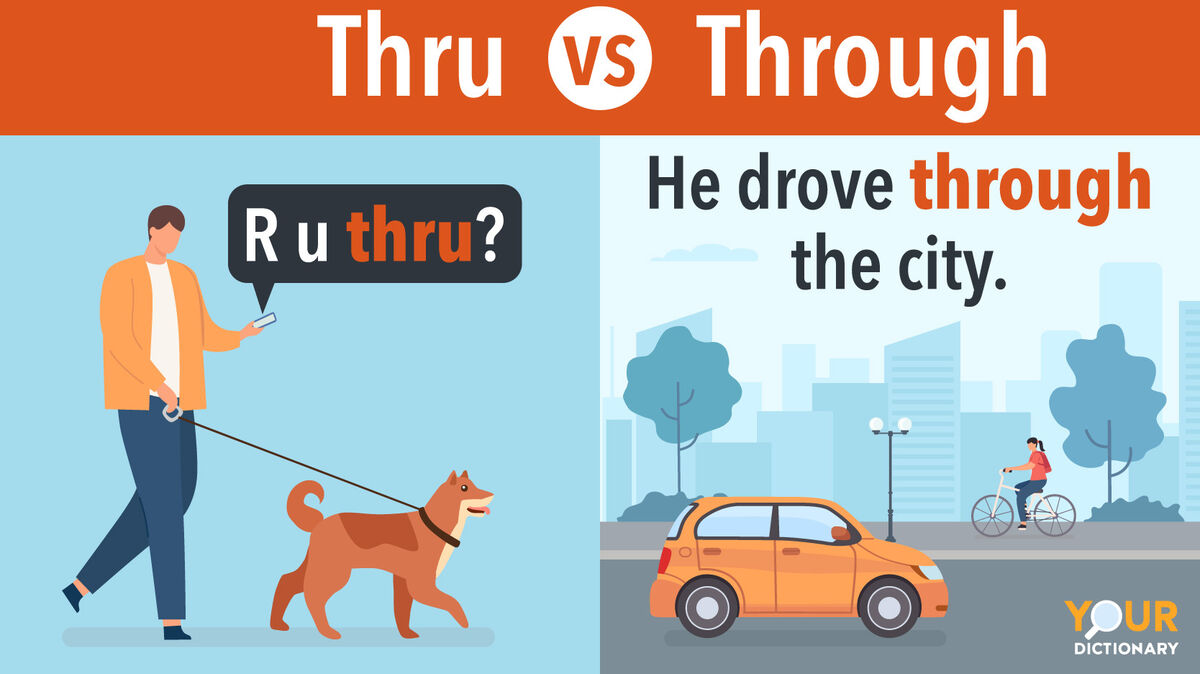Thru is the informal or colloquial variation of through, which usually means the passing of one point to another. The words thru and through are often used interchangeably in casual conversation, but they have distinct differences in their usage and formality.
When is through used?
Through is the more conventional and widely accepted spelling in formal writing and speech. It primarily denotes the act of passing from one side or end of an object, place, or situation to the other. The word through has multiple meanings and can function as a preposition, an adverb, or an adjective.
Preposition
As a preposition, "through" typically indicates movement from one side or point to the other, often implying penetration or passage within something.
- She walked through the forest.
- He looked through the telescope.
Adverb
When used as an adverb, "through" usually indicates completing an action or passing from the beginning to the end of a period or process.
- She read the book from start to finish, all the way through.
- The marathon runner made it through the race despite the rain.
Adjective
Occasionally, "through" can also function as an adjective, suggesting that something has been finished or successfully accomplished.
- They finally completed the through hike of the entire trail.
- After hours of work, they achieved a through understanding of the problem.
In all these uses, through implies a sense of progression, completion, or movement from one point or state to another.
When is thru used?
Thru is commonly seen in signage, advertising, or casual writing, where brevity is prioritized over formality. While it's understood in informal contexts, it's generally not suitable for academic or professional writing.
Example sentence
- Drive-thru fast food restaurants.
- Let's go thru the plan one more time.

In summary, the primary distinction between thru and through lies in their formality and context. "Through" is the standard, formal spelling used in most situations, while "thru" is a more informal, shorthand version seen in casual or promotional contexts. It's essential to choose the appropriate spelling based on the level of formality and the specific requirements of your writing or communication.
Example sentences
- She walked through the park to enjoy the fresh air.
- They drove thru the fast-food restaurant to grab a quick meal. (casual)
- He persevered through numerous obstacles to achieve his dreams.
- We'll need to read through this report carefully before the meeting.
- The river flows thru the valley, creating a scenic landscape. (casual)
- Despite the heavy rain, they hiked through the forest to reach the campsite.
- Please drive through the tunnel; it's the fastest way to the other side.
- She skimmed thru the magazine to find articles of interest. (casual)
- The marathon runner powered through the last stretch of the race.
- They made their way through the crowded marketplace, searching for souvenirs.
Common idioms/phrases
- Through thick and thin: This phrase means enduring both good times and bad times, indicating unwavering support or commitment.
- See through someone/something: To recognize the true nature or intentions of a person or situation, often implying the ability to detect deception.
- Break through: To overcome obstacles or barriers, often used to describe significant achievements or progress.
- Come through: To fulfill a promise or meet expectations, indicating reliability.
- Pull through: To recover from an illness, difficult situation, or crisis.
- Go through the motions: To do something without enthusiasm or genuine effort, often implying a lack of interest or emotional involvement.
- Read through: To examine or review something carefully, often referring to a document or text.
- See it through: To complete a task, project, or commitment despite challenges or difficulties.
- Get through to someone: To successfully communicate or make someone understand, especially when there are obstacles to effective communication.
- Run someone through: To criticize or interrogate someone thoroughly and intensely.
In these sentences, "through" is used in formal or standard English, while "thru" is used in a more informal context, such as signage or casual writing. It's essential to understand the appropriate usage of each spelling based on the context and formality of your communication.
Want to sound like a native speaker?
Engram’s AI-powered grammar checker makes your English sound like a native speaker’s, suggesting natural English expressions on top of fixing grammar, spelling, punctuation, word order, and vocabulary.

Reference:














